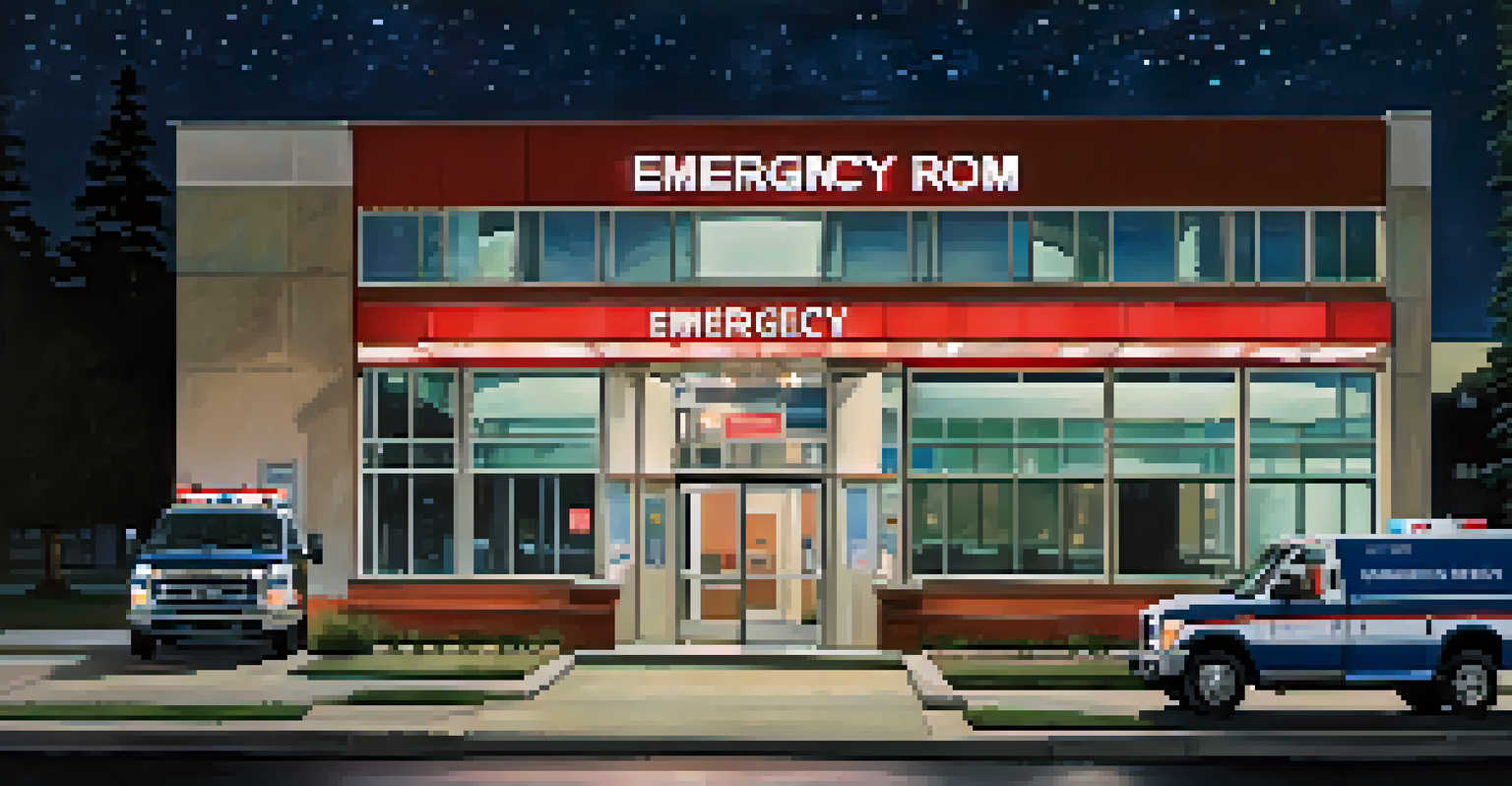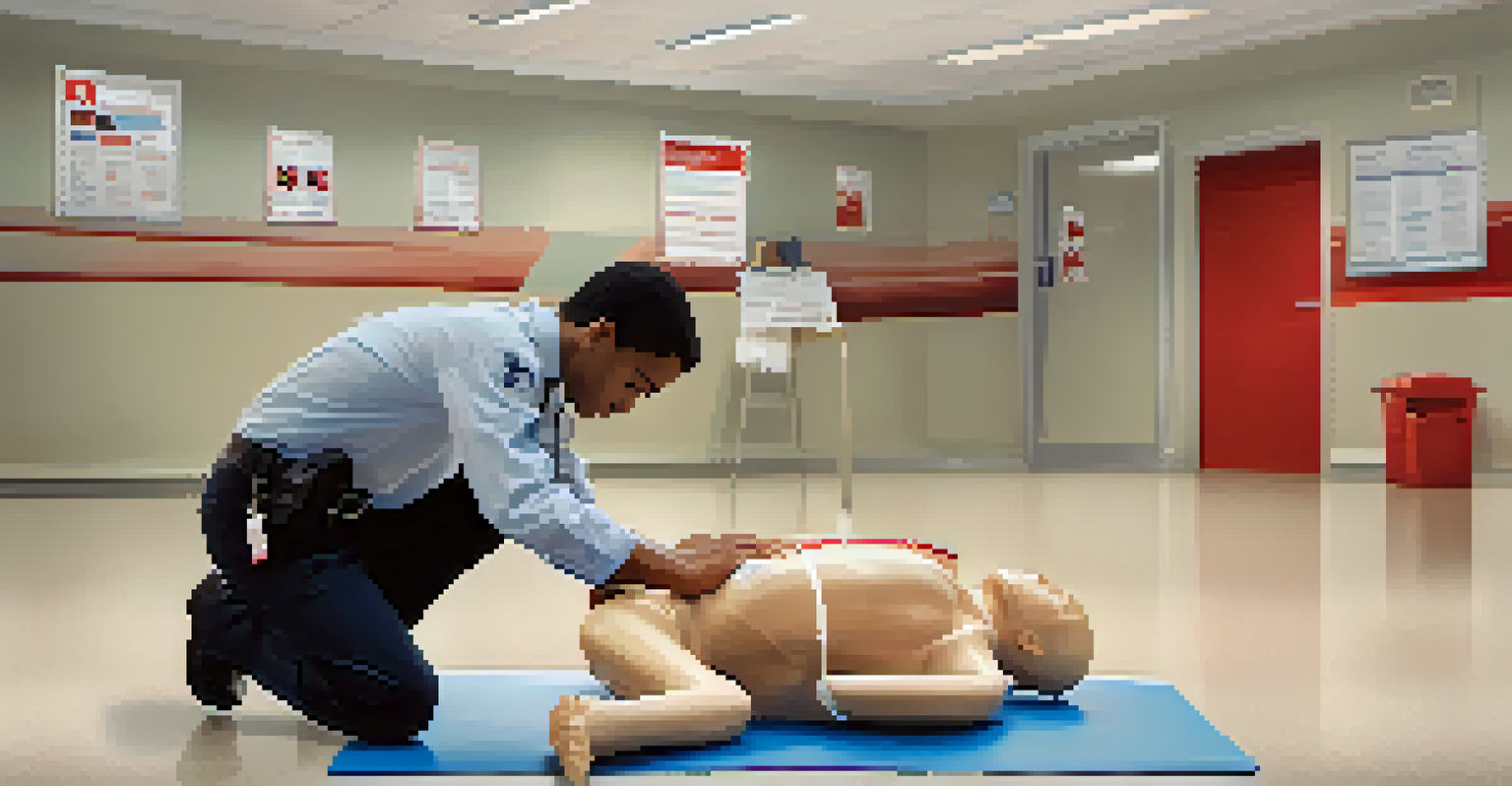Emergency Medicine: When to Seek Immediate Medical Attention

Understanding Emergency Medicine and Its Importance
Emergency medicine is a medical specialty focused on the immediate treatment of acute illnesses and injuries. Its primary goal is to stabilize patients and provide urgent care, ensuring they receive the necessary attention as quickly as possible. This branch of medicine is crucial because timely interventions can significantly impact outcomes, potentially saving lives.
In emergencies, every second counts.
In many cases, the difference between a minor issue and a life-threatening condition can be determined by how quickly medical help is sought. For instance, a simple case of chest pain could be nothing serious, or it could signal a heart attack. Therefore, understanding when to seek emergency care is vital for your health and well-being.
Emergency departments (EDs) are equipped to handle a wide range of situations, from traumatic injuries to severe allergic reactions. Knowing when to go to the ED can alleviate stress and provide peace of mind, ensuring that you or your loved ones receive the right care promptly.
Recognizing Symptoms that Require Immediate Attention
Certain symptoms should never be ignored, as they may indicate a serious condition. For example, sudden chest pain, difficulty breathing, or severe headache could point to emergencies like a heart attack or stroke. If you experience these symptoms, don't hesitate; seek medical help right away.

Similarly, if you notice signs of a severe allergic reaction, such as swelling of the face or throat, or difficulty swallowing, it's crucial to act fast. Anaphylaxis can escalate quickly, and immediate medical intervention can be life-saving. Understanding these warning signs can empower you to take quick action.
Emergency Medicine Saves Lives
Timely interventions in emergency medicine can significantly impact patient outcomes and potentially save lives.
Moreover, symptoms like uncontrolled bleeding, severe burns, or sudden confusion can also signal the need for urgent care. By being aware of these indicators, you can help ensure that you or someone around you gets the necessary medical attention without delay.
When to Call 911 or Go to the Emergency Room
Deciding whether to call 911 or head straight to the emergency room can be daunting. A good rule of thumb is to call for help if you suspect a life-threatening situation. If you're unsure, erring on the side of caution is always wise; emergency responders can assess the situation and provide guidance.
The best way to predict the future is to prepare for it.
For instance, if someone collapses or is unresponsive, calling 911 is imperative. Even if the situation turns out to be less severe than anticipated, it's better to be safe than sorry. Emergency services are trained to handle a variety of crises and can often reach you faster than you can get to the hospital.
Additionally, if you are experiencing severe pain or distress that cannot wait—like a compound fracture or intense abdominal pain—going to the ED can be the right choice. These situations require immediate attention and should not be delayed.
Common Emergency Situations to Be Aware Of
Everyday activities can lead to emergencies, and being prepared can make all the difference. Common situations include car accidents, falls, or sudden allergic reactions. These incidents can occur unexpectedly, making it essential to be aware of the potential risks around you.
For example, a slip in the kitchen can lead to a serious injury, especially if you injure your head or back. In such cases, it's better to seek medical evaluation rather than risk complications later on. Recognizing that not all injuries are visible is vital for your safety.
Recognize Urgent Symptoms
Being aware of symptoms like chest pain or difficulty breathing can empower you to seek immediate medical help.
Another scenario is sports injuries, which can range from sprains to concussions. If you suspect a head injury or experience symptoms like confusion or dizziness, it's crucial to seek medical attention immediately, as these could lead to more severe issues if untreated.
The Role of Health Insurance in Emergency Care
Understanding your health insurance coverage can alleviate some of the stress associated with seeking emergency care. Many insurance plans cover emergency services, but the specifics can vary widely. It's essential to be familiar with your policy so you know what to expect regarding costs.
When you visit an emergency room, it's typically expected that the focus remains on your health rather than your insurance status. However, having a general idea of your coverage can help you make informed decisions. For instance, knowing if your plan includes out-of-network benefits can be helpful if you're far from home.
Ultimately, while health insurance considerations are important, they should never delay seeking care. If you're in doubt about your coverage, prioritize your health first and address any financial concerns afterward.
How to Prepare for an Emergency
Preparation can make a significant difference in emergency situations. Start by having a basic first aid kit at home and in your car, stocked with essentials like band-aids, antiseptic wipes, and over-the-counter medications. This kit can help you handle minor injuries while waiting for professional help if needed.
Additionally, familiarize yourself with the nearest emergency room and urgent care facilities in your area. Knowing where to go in advance can save valuable time during a crisis. You might even want to plan a route and keep a list of emergency contacts handy.
Preparation is Key in Emergencies
Having a first aid kit and knowing your nearest emergency facilities can make a crucial difference during a crisis.
Lastly, consider learning basic first aid and CPR. These skills can empower you to assist others and potentially save a life before emergency services arrive. Being prepared means not only knowing what to do in an emergency but also having the tools and resources at your disposal.
Aftercare Following an Emergency Situation
Receiving emergency care is just the first step; aftercare is equally important to ensure full recovery. Whether you’ve been treated for a minor injury or a more severe condition, following your doctor's instructions for recovery is crucial. This may include follow-up appointments and rehabilitation exercises.
It’s also essential to monitor your symptoms and be aware of any changes that may require further medical attention. Sometimes, complications can arise after an emergency situation, and being vigilant can help catch these issues early. Don't hesitate to reach out to your healthcare provider if something doesn't feel right.

Lastly, consider discussing your experience with someone you trust. Emotional support can be a vital part of recovery, especially after a frightening medical incident. Sharing your feelings can help you process the event and regain a sense of normalcy in your life.